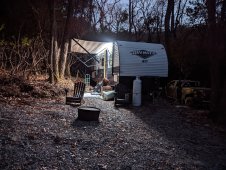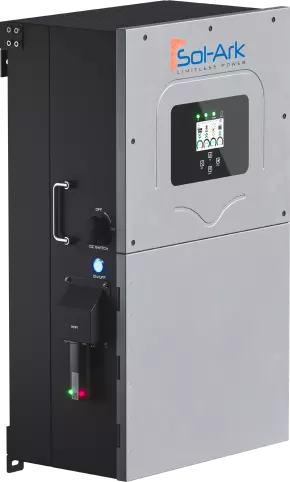Bogey1
New Member
Hello,
Warning: This is a long post so it might take a minute to read, and if it is not allowed just delete it
Thanks for letting me join this forum and I hope everyone had a happy, and safe, holiday season. So, quick background: I have no real RV, or solar, knowledge but I have 20 years of electronics experience from the Navy. I have a travel trailer parked on some mountain property and the electric company wants $12k to install power, plus I need to get the ditches dug, another $4k, and I need to buy all panels. So it will probably be around $15k for electricity, which I will eventually need for a house but that is at least 5 years away. I currently have a brand new tri-fuel 7,500 watt generator on site, but we don't run it at night because of the noise, not for us but for others in the area that are trying to enjoy the peace and quiet. We also don't want to have to run it all day long with ethanol-free gas being about $5 a gallon. After talking, in great detail, with my RVing neighbor, he recommended I go solar. I began watching videos, but most seemed to be over the top for what I need, so I posted on some Facebook groups and everyone recommended Will Prowse. I looked him up, watched a couple of videos, and read his comments where he said he does not do consultations and that it is best to join this forum to ask for help.
My camper has a 30 amp system and I am looking at a solar system that will be able to supply adequate power for about 4 days at a time, with about 5 or 6 weeks between visits. I will be building a full-time panel array, not on top of the camper, that I will be able to aim for best energy collection. I will also be building a little 'shed' to house the batteries, and all other components, and would like a receptacle in there that I could plug my shore power cable into. I know that sizes are all based on current draw for my equipment, unfortunately the camper is 5 hours away so I cannot get that information right now. But a quick rundown of what I am looking at powering is - the refrigerator, a pot of coffee in the morning, some hot water (currently propane, but may have burned that up by mistake, in which case we will put in an electric one) for dishes, and showers every other day, maybe the microwave a couple times a day, maybe a portable single burner induction plate, lights at night, maybe a little bit of TV (DVD since no cable) at night, maybe the A/C for an hour or two before bed, and charging a laptop, cell phones, and batteries for power tools (maybe a couple plug in tools).
Since specific sizing cannot be accomplished, without specific equipment data, what I am really looking to get right now is a better understanding of what components are 'needed' and some good sources to purchase them from. Based on what I have seen so far building my own LiFePO4 batteries is the way to go, but what else do I need? Watching videos, and reading posts in Facebook groups, shows all kinds of things like MPPT controllers, inverters, shunts, battery monitoring systems, battery chargers, disconnects, etc., and then they always show top of the line products. Navy retirement pay is not all that much, so I do not need top of the line equipment, this is a weekend getaway trailer that needs cheap, yet reliable, power for about 10 long weekends a year for the next 5 years...without starting a forest fire.
Thanks,
Bill
Warning: This is a long post so it might take a minute to read, and if it is not allowed just delete it
Thanks for letting me join this forum and I hope everyone had a happy, and safe, holiday season. So, quick background: I have no real RV, or solar, knowledge but I have 20 years of electronics experience from the Navy. I have a travel trailer parked on some mountain property and the electric company wants $12k to install power, plus I need to get the ditches dug, another $4k, and I need to buy all panels. So it will probably be around $15k for electricity, which I will eventually need for a house but that is at least 5 years away. I currently have a brand new tri-fuel 7,500 watt generator on site, but we don't run it at night because of the noise, not for us but for others in the area that are trying to enjoy the peace and quiet. We also don't want to have to run it all day long with ethanol-free gas being about $5 a gallon. After talking, in great detail, with my RVing neighbor, he recommended I go solar. I began watching videos, but most seemed to be over the top for what I need, so I posted on some Facebook groups and everyone recommended Will Prowse. I looked him up, watched a couple of videos, and read his comments where he said he does not do consultations and that it is best to join this forum to ask for help.
My camper has a 30 amp system and I am looking at a solar system that will be able to supply adequate power for about 4 days at a time, with about 5 or 6 weeks between visits. I will be building a full-time panel array, not on top of the camper, that I will be able to aim for best energy collection. I will also be building a little 'shed' to house the batteries, and all other components, and would like a receptacle in there that I could plug my shore power cable into. I know that sizes are all based on current draw for my equipment, unfortunately the camper is 5 hours away so I cannot get that information right now. But a quick rundown of what I am looking at powering is - the refrigerator, a pot of coffee in the morning, some hot water (currently propane, but may have burned that up by mistake, in which case we will put in an electric one) for dishes, and showers every other day, maybe the microwave a couple times a day, maybe a portable single burner induction plate, lights at night, maybe a little bit of TV (DVD since no cable) at night, maybe the A/C for an hour or two before bed, and charging a laptop, cell phones, and batteries for power tools (maybe a couple plug in tools).
Since specific sizing cannot be accomplished, without specific equipment data, what I am really looking to get right now is a better understanding of what components are 'needed' and some good sources to purchase them from. Based on what I have seen so far building my own LiFePO4 batteries is the way to go, but what else do I need? Watching videos, and reading posts in Facebook groups, shows all kinds of things like MPPT controllers, inverters, shunts, battery monitoring systems, battery chargers, disconnects, etc., and then they always show top of the line products. Navy retirement pay is not all that much, so I do not need top of the line equipment, this is a weekend getaway trailer that needs cheap, yet reliable, power for about 10 long weekends a year for the next 5 years...without starting a forest fire.
Thanks,
Bill
Attachments
Last edited:






